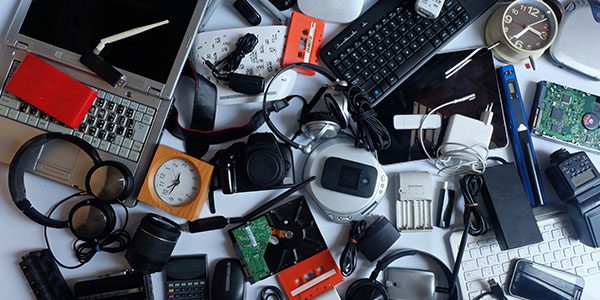Sustainable Electronics Disposal: Make Sure Conformity with R2 Certification
Sustainable Electronics Disposal: Make Sure Conformity with R2 Certification
Blog Article
Master the Demands of R2 Certification to Ensure Sustainable Organization Practices
Making sure sustainable service methods has actually become a foundation of corporate responsibility in today's worldwide landscape. At the forefront of this movement is the R2 accreditation, a rigorous requirement that establishes the bar high for electronic devices recyclers and refurbishers. As businesses aim to straighten with environmentally aware practices, grasping the needs of R2 certification is vital. By sticking to these criteria, companies not just reinforce their ecological integrity yet also acquire an affordable side in an increasingly eco-conscious market. The roadmap to accomplishing R2 qualification is multifaceted, involving a deep understanding of crucial parts, thorough steps towards compliance, and a commitment to continuous upkeep. In a globe where sustainability is no longer a mere buzzword but a service necessary, diving right into the intricacies of R2 certification is a tactical step that can lead the means for lasting success and favorable ecological influence.
Relevance of R2 Certification
Attaining R2 Certification is crucial for businesses intending to demonstrate their commitment to responsible and lasting digital waste management practices. This qualification, established by SERI (Sustainable Electronic Devices Recycling International), sets the standard for accountable recycling techniques in the electronics sector. By acquiring R2 Certification, organizations signal to their stakeholders that they stick to stringent ecological, health and wellness, and safety and security guidelines while managing digital waste.
One of the vital reasons that R2 Qualification is essential is its focus on sustainability. With electronic waste being a significant worldwide concern, services need to showcase their devotion to reducing the environmental influence of their operations. R2 Accreditation requires business to apply processes that make sure the proper handling, refurbishment, and recycling of digital waste, thus adding to the round economic climate and lowering the accumulation of e-waste in garbage dumps.
In Addition, R2 Certification improves a firm's reputation and reputation. In today's environmentally mindful market, partners and consumers are significantly looking to work together with services that prioritize sustainability. By accomplishing R2 Qualification, firms can distinguish themselves as leaders in accountable e-waste administration, getting an one-upmanship and attracting like-minded stakeholders.
Key Components of R2 Requirements

Actions to Obtain R2 Accreditation
To get approved for R2 Certification, services must carefully show conformity with a set of strict standards and standards. click to read The process of acquiring R2 Accreditation entails several essential actions. The initial step is to familiarize oneself with the R2 Requirement and its needs. This consists of understanding the principles of accountable recycling, information security, ecological security, and employee wellness and safety that form the foundation of the accreditation.
Next, services need to examine their current methods and processes to determine any kind of spaces that require to be addressed to satisfy the R2 Standard. This may entail executing brand-new treatments, investing in training programs, or making adjustments to existing operations. When any kind of deficiencies are corrected, companies can proceed to establish a thorough management system that straightens with the R2 needs.
Following the execution of the necessary modifications, organizations must go through a third-party audit to confirm their conformity with the R2 Standard (r2 certification). This audit is conducted by a recognized qualification body and includes a comprehensive testimonial of the company's centers, procedures, and documentation. Upon successful completion of the audit, services can obtain their R2 Accreditation, showing their dedication to lasting and liable business practices
Benefits of R2 Compliance
Companies that stick to R2 compliance requirements can open a myriad of advantages in today's lasting organization landscape. Furthermore, R2 conformity promotes environmental sustainability by making certain that electronic waste is managed in an environmentally pleasant manner, reducing the impact on garbage dumps and natural sources. Overall, accomplishing R2 conformity not just helps companies fulfill governing requirements however likewise cultivates a society of environmental responsibility and operational excellence.
Preserving R2 Qualification
Showing an ongoing dedication to responsible electronic waste management methods, organizations need to concentrate on the thorough procedure of keeping R2 certification. Maintaining R2 certification involves regular audits, internal reviews, and straight from the source continuous improvement efforts to guarantee compliance with the strict requirements set forth by the Responsible Recycling Practices (R2) standard. Organizations must stay watchful in monitoring their electronic waste monitoring procedures, information safety procedures, and general environmental efficiency to maintain their R2 accreditation condition.
Routine training and education for employees are vital to keep R2 qualification, as team member need to be educated regarding the most current finest practices and sector requirements. Keeping detailed records and documents of electronic waste recycling activities, downstream suppliers, and interior processes is critical for showing compliance throughout audits.
Moreover, organizations need to proactively engage with their supply chain companions and vendors to make certain that all entities associated with the digital waste monitoring process follow R2 criteria. By fostering a culture of transparency, liability, and continual renovation, companies can efficiently preserve their R2 certification and maintain their commitment to lasting company techniques.
Conclusion

Accomplishing R2 Certification is crucial for organizations intending to demonstrate their dedication to sustainable and responsible digital waste administration practices. By getting R2 Accreditation, businesses signal to their stakeholders that they stick to strict environmental, health and wellness, and safety laws while handling digital waste.
Upon successful conclusion of the audit, services can receive their R2 Accreditation, demonstrating their dedication to liable and sustainable organization methods.
Keeping R2 accreditation includes regular audits, interior testimonials, and constant renovation efforts to make sure compliance with the strict needs set forth by the Accountable Recycling Practices (R2) criterion. By comprehending the vital components of R2 requirements, taking the essential steps to acquire accreditation, and gaining the benefits of R2 conformity, companies can demonstrate their commitment to liable digital waste management.
Report this page